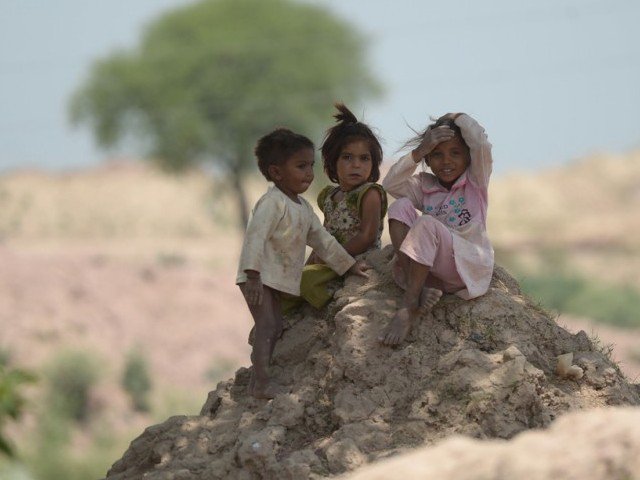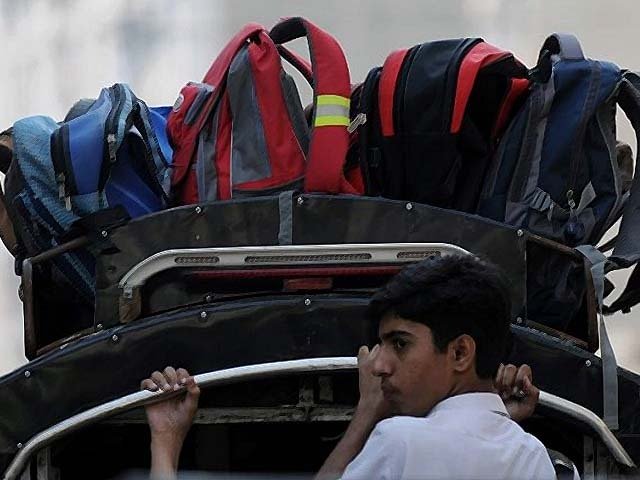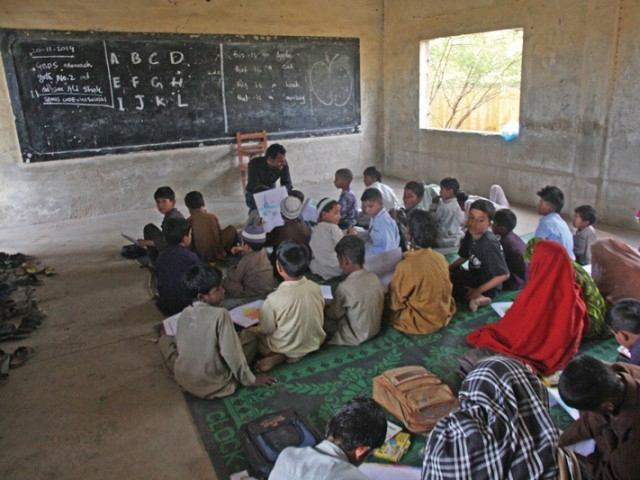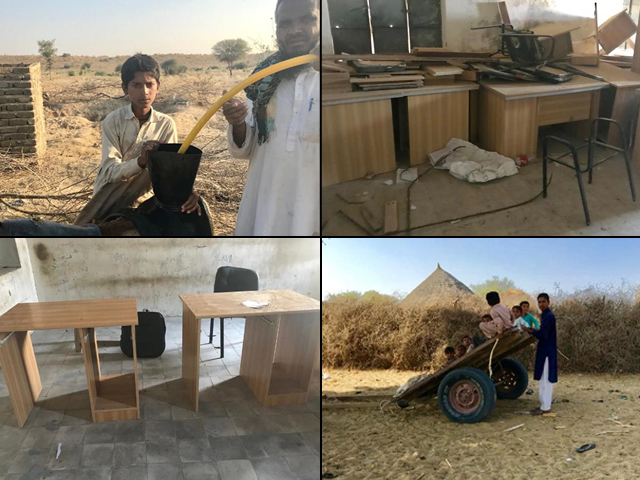
These children are essentially missing from all records with no documentation regarding their whereabouts. PHOTO: AFP
Abandoned and neglected, Sindh's orphans continue to suffer in silence
Not a single orphanage is registered and the children are not even included in statistics
From the moment I attended the first board meeting of the Sindh Darul Atfal, I have been in a state of shock. I fail to understand how the orphans in Sindh are beyond their constitutional right to have an education provided by the state, as per Article 25A of our Constitution.
Why can these children only be restricted to a life of becoming welders, plumbers, electricians or tailors? Although there is absolutely nothing wrong with any of these professions, but you have to acknowledge a problem if these are the only options available due to a lack of a formal education provided to a certain group of children; those who do not have parents or have been abandoned.
Sadly, the problem faced by the orphans in Sindh is much bigger.
Children living in orphanages for prolonged periods of time fall behind in their development goals, and suffer significantly from worsened mental health. Children from orphanages are not even included in statistics, making it easy to traffic them, abuse them in other ways, or simply neglect providing them their rights, as no one will notice in any case or come looking for them. These orphans are thus one of the most vulnerable segments of our society.
The Sindh Darul Atfal (Supervision and Control) Act was promulgated in 1976, and is generally called the orphanage law. The law was aimed at regulating orphanages in the province but its implementation was never enforced. This has resulted in uncontrolled orphanages in the entire province, but especially in Karachi.
How many of these orphanages are extending true services or are running on a commercial basis? The government does not know.
I was surprised to discover that not a single orphanage is registered under the Sindh Darul Atfal (Supervision and Control) Act, 1976, and that the Sindh government possesses no details of the orphanages in the province.
After the Sindh High Court’s (SHC) recent decision pertaining to orphans’ welfare, the Social Welfare Department of Sindh collected a database of more than 40 orphanages operating in the province. Since no registration process was ever followed, the government did not have a standard operating procedure (SOP) in place to enforce minimum standards and check their compliance.
This neglect and ineptitude has created a direct risk to the lives of these children. Sadly, there was also no record of any of the orphans being adopted or the girls leaving after being married off, so these children are essentially missing from all records with no documentation regarding their whereabouts. Perhaps even worse is that none of these orphanages have systems in place to send these children to formal educational institutes, and thus there is no checking the kind of education, if any, they receive in these homes.
Over the past years, the orphanages in Sindh have not been subjected to any monitoring or overseeing by authorised government departments such as Social Welfare. We have seen several big loud voices for donations for this very cause, and yet no one has asked for any audits or reporting of where the funds were used, which is lucrative for the owners who receive official and unofficial payments and “donations” but never spend them on the kids.
 Alongside the children at an orphanage
Alongside the children at an orphanageThe respected court will need to intervene in this matter yet again and issue injunctions against the government departments involved, primarily because of the non-effective role of the provincial government. Several consulates have also expressed concern over the reported exploitation of children by these orphanages which has resulted in a reputational loss for the government, mainly for not meeting international and United Nations’ requirements for the treatment and rights of children or taking action against their abuse.
In light of this, the SHC’s judgment, which critically reviewed the role of Darul Atfals (orphanages) in failing to provide welfare to orphans, must be applauded. The Honourable SHC issued directions in the order that all orphanages should be registered under the orphanage law immediately, as well as maintain data of all orphans, provide an audit of accounts over the last 10 years and ensure a purposeful educational system. The SHC also ordered that the National Database and Registration Authority (NADRA) must ensure issuance of B-forms and computerised national identity cards (CNIC) to orphans so they can be documented.
Now it is the role of the Sindh Social Welfare Department – with the approval of its honourable minister – to ensure implementation of the orphanage law.
One positive step taken has been to constitute the Orphanage Board (which I am a part of) after a period of three decades – yes, three decades. Details of orphanages in the province are being listed while an SOP has been prepared and communicated to the orphanages for compliance.
Now it is important to take the next step, which is to conduct surveys to check and validate the orphanages’ compliance according to the defined SOP. I was briefed that the notice has been published in newspapers requiring orphanages to get registered under the orphanage law, which has also been communicated to every orphan home in the province, alongside NADRA’s new policy under the Supreme Court judgment. The request by the Social Welfare Department for the cancellation of orphanage registrations under any other law has been approved by the Chief Secretary Sindh, and the only things left is implementation, which is easier said than done.
I strongly recommend that the orders of the SHC should be implemented by the Social Welfare Department and the Sindh government should provide all possible help and machinery to regulate the orphanages in the province, because every child matters and it is the state’s responsibility to ensure their fundamental rights are being met, including their right to a formal education.
I request the minister of Social Welfare and the Sindh government to setup orphanage monitoring units in every district. Details of orphanages working without registration should be published though print, electronic and social media for the general information and awareness of the public. Orphanages not complying with any or all provisions of the law should be fined or sealed. I have also proposed in my pre-budget speech to allocate an endowment fund for the welfare of orphans by the orphanage board, which is also a part of the court order and therefore essential for the Sindh government to allocate in the upcoming budget.
I sincerely hope it will not take another three decades for the Sindh government to ensure all children here are given their basic rights. Orphaned children are the social responsibility of the state and we must address their issues collectively and ensure they are included in our country’s development.




COMMENTS
Comments are moderated and generally will be posted if they are on-topic and not abusive.
For more information, please see our Comments FAQ